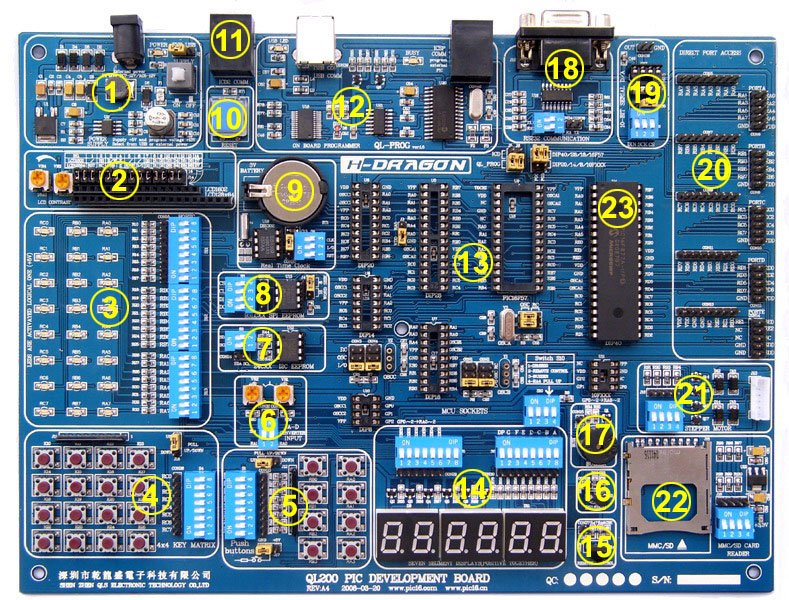Preprocessor directives and macros in C for PIC microcontrollers allow you to optimize code, improve readability, and increase efficiency.
These directives are processed before compilation, making them powerful tools for defining constants, creating reusable code snippets, and conditional compilation.
This tutorial covers:
- What preprocessor directives are
- Types of preprocessor directives
- How to use macros effectively
- Practical examples for PIC microcontrollers
What Are Preprocessor Directives?
Preprocessor directives are special instructions that begin with # and are executed before compilation. They are not actual C code but commands for the compiler.
Common Uses:
Define constants
Create macro functions
Include files
Conditional compilation
Types of Preprocessor Directives
| Directive | Purpose |
|---|---|
| #define | Defines macros and constants |
| #include | Includes header files |
| #ifdef / #ifndef / #endif | Conditional compilation |
| #pragma | Compiler-specific settings |
| #undef | Undefines a macro |
| #error | Generates a custom compilation error |
| #ifdef / #else / #endif | Compiles code conditionally |
Using #define for Constants
The #define directive allows you to create constants without using memory space.
Example : Defining Constants
#include <xc.h>
#define LED_PIN RB0 // Define LED connected to PORTB0
#define DELAY_TIME 1000 // 1 second delay in milliseconds
void main() {
TRISB0 = 0; // Set LED_PIN as output
while(1) {
LED_PIN = 1; // Turn LED ON
__delay_ms(DELAY_TIME);
LED_PIN = 0; // Turn LED OFF
__delay_ms(DELAY_TIME);
}
}
Advantages:
- No extra memory usage (unlike const).
- Improves readability.
Creating Macros for Code Simplification
Macros allow defining short functions that are replaced before compilation.
Example : Creating a Macro for LED Toggling
#include <xc.h>
#define LED_TOGGLE() (RB0 = !RB0) // Macro to toggle LED
void main() {
TRISB0 = 0; // Set LED_PIN as output
while(1) {
LED_TOGGLE(); // Toggle LED
__delay_ms(500);
}
}
Key Points:
- LED_TOGGLE() replaces RB0 = !RB0 before compilation.
- Avoids repetitive code.
Using Macros with Parameters
Macros can accept arguments, making them more flexible.
Example : Defining a Square Function
#include <xc.h>
#define SQUARE(x) ((x) * (x)) // Macro to calculate square
void main() {
int result = SQUARE(4); // Expands to (4 * 4) = 16
while(1);
}
Key Points:
- The macro expands before compilation.
- Parentheses prevent operator precedence issues.
Conditional Compilation Using #ifdef and #ifndef
Conditional compilation allows compiling only parts of the code based on predefined macros.
Example : Debug Mode
#include <xc.h>
#define DEBUG // Uncomment this line to enable debugging
void main() {
TRISB0 = 0;
#ifdef DEBUG
RB0 = 1; // Turn ON LED for debugging
#endif
while(1);
}
Key Points:
- If DEBUG is defined, the LED turns ON.
- If #define DEBUG is removed, the LED does not turn ON.
Including Header Files Using #include
Header files store reusable functions and macros.
Example : Creating a Custom Header File
Create a header file (led.h)
// led.h #ifndef LED_H #define LED_H #define LED_PIN RB0 #define LED_ON() (LED_PIN = 1) #define LED_OFF() (LED_PIN = 0) #endif
Include it in the main program
#include <xc.h>
#include "led.h" // Include custom header file
void main() {
TRISB0 = 0; // Configure LED pin
while(1) {
LED_ON();
__delay_ms(500);
LED_OFF();
__delay_ms(500);
}
}
Key Points:
- #ifndef LED_H prevents multiple inclusions.
- Macros simplify LED control.
Using #pragma Directives
#pragma is used for compiler-specific settings.
Example : Disabling Warnings
#pragma warning disable 520 // Disable warning 520 (unused variable)
void main() {
int unusedVar; // Normally, this would trigger a warning
while(1);
}
Use Cases:
- #pragma config for configuration bits.
- #pragma interrupt for interrupt handlers.
#undef – Removing Macros
If you want to remove a macro, use #undef.
Example : Undefining a Macro
#define LED_PIN RB0
#undef LED_PIN // Remove LED_PIN definition
void main() {
// LED_PIN will now cause an error if used
}
Generating Compilation Errors Using #error
#error can stop compilation if conditions are not met.
Example : Checking Compiler Version
#if __XC8_VERSION__ < 2000
#error "Upgrade your XC8 compiler!"
#endif
void main() {
while(1);
}
If XC8 version is below 2.0, compilation stops with an error.
Summary
| Directive | Purpose | Example |
|---|---|---|
| #define | Create constants/macros | #define LED_PIN RB0 |
| #include | Include header files | #include “led.h” |
| #ifdef / #ifndef | Conditional compilation | #ifdef DEBUG |
| #pragma | Compiler-specific settings | #pragma config FOSC = HS |
| #undef | Remove a macro | #undef LED_PIN |
| #error | Stop compilation with an error | #error “Invalid Compiler” |
Best Practices
Use #define for constants instead of const (to save RAM).
Use header files to store reusable macros.
Wrap header files with #ifndef and #define to avoid duplication.
Use parentheses in macros to prevent operator precedence errors.
Avoid overusing #define for functions, use inline functions instead.


